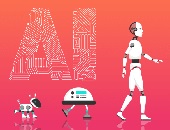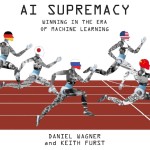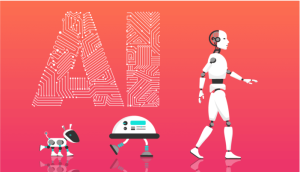“There is definitely a race for AI going on,” said Keith Furst, Managing Director, Data Derivatives. “You might wonder, is there any hope of catching up if you are not already in the race?”
He was one of two speakers at a webinar titled “Artificial Intelligence: Running the Race and Managing the Risks,” sponsored by the Global Association of Risk Professionals (GARP) on October 16, 2018. Furst and Daniel Wagner co-authored the new book AI Supremacy: Winning in the Era of Machine Learning.
At the outset, Furst described the process of “cognification” that has been transforming our world. “As everything becomes digitized, everything can be cognified,” or learned by machines, and this why AI can be applied to most aspects of modern life.
As an example, he pointed to AI software currently being used by businesses, such as AI that monitors newsfeeds and decides what trades to make, based on the positive or negative sentiments detected in the newsfeeds. Such software is considered intelligent “if it learns from the data. Machine learning means a system will learn automatically without needing to be explicitly programmed to do so.”
Furst acknowledged the public has a feeling of unease about AI. “If, as Nietzsche claimed, reason killed God, will artificial intelligence kill work?”
His presentation summarized the effect of AI on five areas: Financial Services; Science & Healthcare; Evolutionary Communications; The Future of Learning; and Smarter Government. These are covered in succession below.
Financial Services
“AI means banking will become frictionless. Access to accounts through biometrics means transactions will be faster for the customer,” Furst said. A problem, however, can arise precisely because our biometrics do not change drastically, so if our biometric information is compromised, it cannot be recovered, which implies greater fraud risk over time.
Predictive capabilities can become too invasive. He gave an example of the AI algorithm being used at Target stores. The algorithm analyzed data from a young customer’s shopping basket and sent baby-related advertisements to the home of the minor because the company predicted someone in the household was pregnant. The mail was intercepted by her father who was perplexed by the content of the advertisements, but essentially Target knew the girl was pregnant even before her own father did.
“Deep fraud will become even worse,” Furst predicted. “Fake news will be harder to distinguish.” Bad agents will learn to fake biometric information.
An example of adaptive learning in a complex environment is the AI being deployed by high-speed traders. This decreases the emphasis placed on the fundamental performance of companies. Furst said, “this will create a more fragile financial market.”
Science & Healthcare
Furst said science and medicine will be big winners due to the applications of AI. “Scientists who use AI will replace those who don’t” and will continue to make bigger and more important discoveries.
Great inroads have been made in the early detection of cancer by using machine learning to examine blood cells and other tissue. Development of increasingly more accurate predictive techniques will follow as the systems become more trained on ever larger datasets.
Genetic sequencing and editing are other big winners. Gene editing using CRISPR techniques could cure diseases.
Communications
Furst pointed out the 5G, or fifth generation, of smartphones will transfer more data, thus strengthening the data and AI feedback loop. Currently, AI has challenges with the all-too-human activities of negotiating, debating, and lying—but it is already catching up.
“Will it be an extended or shrunken reality?” he asked. “You could have augmented reality for training.” As an example, paramedics could be immersed in virtual reality to deal with catastrophic situations, ones that have not occurred, but that would improve their training for emergencies.
There may be drawbacks to communicating so much data. “There are already cognitive stores such as the Amazon Go location. In such stores, they recognize your face and when you pick up or set down an item. We give up data about our physical (not digital) selves as we enter these stores.”
The Future of Learning
“What are we supposed to teach the next generation?” Furst asked. Teachers already manage customized learning objectives, to a certain extent, for each student and AI could help with this task.
Immersive learning is already recognized as a powerful way to teach; AI will make it readily available. ARPA-Ed is a U.S. policy initiative that could bring more innovation to classrooms, but it has failed to get enough support and funding. The U.S. military has already seen positive outcomes from teaching with digital tutors and these systems can customize the pace and content of lessons to keep students engaged based on their individual interests. He predicted open access to student data, in which the data will be used to train AI and become part of infrastructure that teaches students.
Smarter Government
“Smarter government is all about managing complexity more efficiently,” Furst said. “Smart cities will utilize limited resources better.” For example, a city wants a certain amount of green spaces, and needs to know how to manage land resources among inhabitants, industries, and businesses: this is the type of complex problem that AI can deal with effectively.
“Who is using AI and for what reason?” Furst asked. “This affects democratic choice.” Government is currently not so good at detecting fraud. He foresees roles for AI in modeling legislative changes, and in facilitating the election process and reducing corruption.
AI: Should we fear it or embrace it?
“In 2001, of the top five companies in the world, only one was a tech company,” Furst noted. “In 2016, four out of five of them were tech.” He said, “Data is the new oil.”
“AI is all about creating, managing, predicting the future,” according to Furst, and people should think about how much they want AI involved in their lives. “Ask yourself: do you want to go into a cognitive store?” Although it will be easier to carry out transactions, what data do you want to give to big companies?”
General Data Protection Regulation (GDPR) is the privacy legislation recently enacted in the European Union that some pundits have dubbed “the right to be forgotten.” He said that with GDPR, the E.U. will fall behind in the race for AI supremacy, because it will restrict data available.
If we embrace AI, we could be headed for a “Black Mirror utopian reality,” in which humans get locked into AI systems where there are unintended consequences.
“The concept of the ‘selfish gene’ has all these organisms helping to replicate the gene. In the same way, the ‘selfish ledger’ has all this data being collected in order to replicate the ledger.” Furst said AI systems could start to nudge us toward behaviour that will build its dataset and this may or may not be healthy or helpful. The issues raised by both presenters are dealt with in more detail in their new book, “AI Supremacy: Winning in the Era of Machine Learning.” Their talk concluded with a lively and informative Q&A at the end of the webinar.ª
Keith Furst’s presentation was interwoven with Daniel Wagner’s presentation. Click here to read about Daniel Wagner’s presentation.
The AI graphic in the thumbnail for this posting is from the website Growthmedia.ca.
The smart city graphic is by Capankajsmilyo – Own work, CC BY-SA 4.0.
“Data is the new oil” – this quotation is now attributed to Clive Humby, a UK mathematician.








